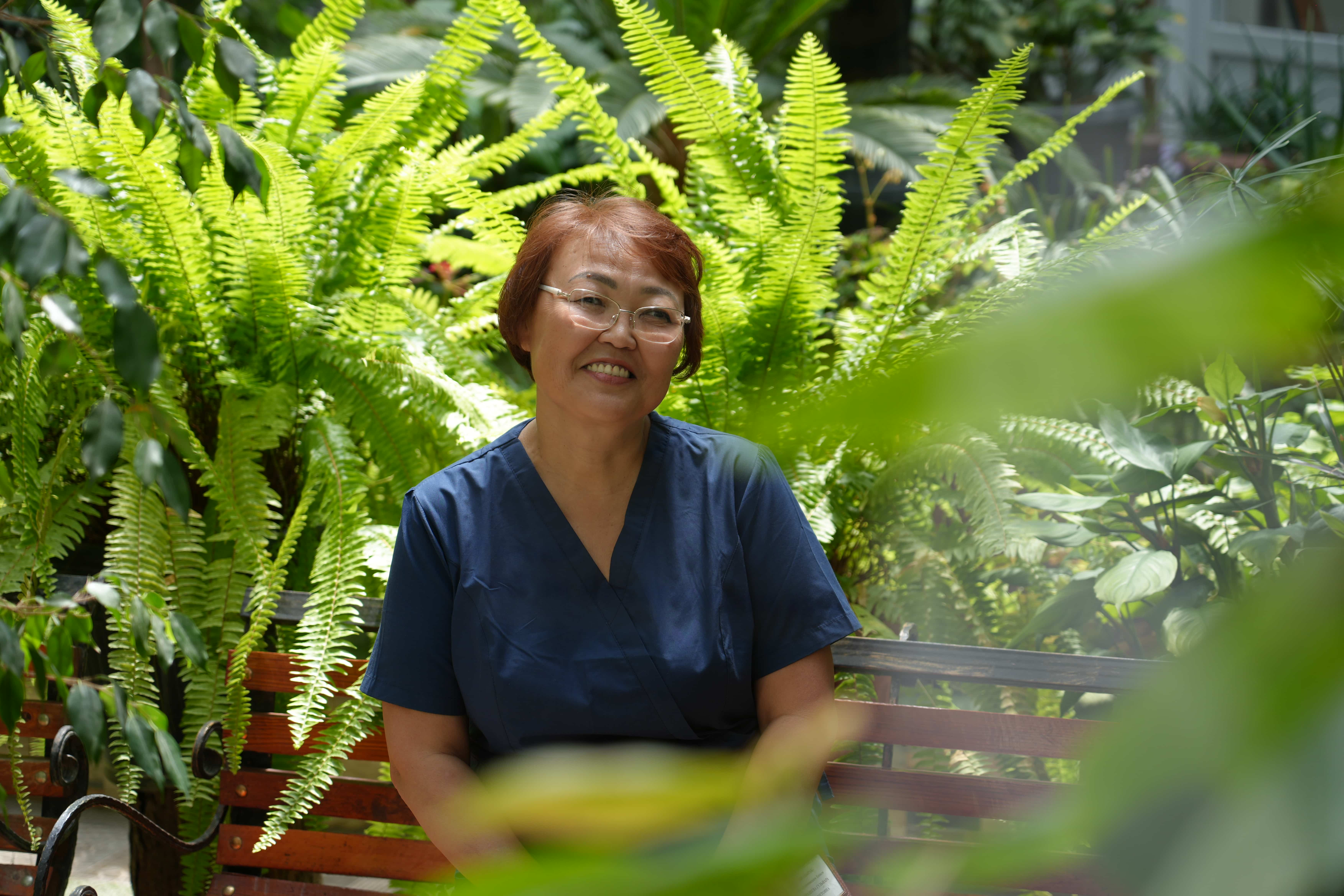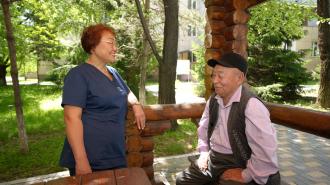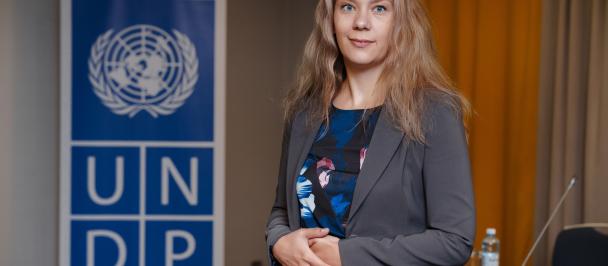Stories of Compassion and Resilience: Gulnara Abdrasheva’s Journey in Healthcare
July 11, 2024

Gulnara Abdrasheva is a healthcare professional with 35 years of experience. For many years, she led the therapeutic department at the city hospital in Lisakovsk, Kostanay region. In addition to her main job, she also worked as a therapist at the "House of Mercy" Social Services Center.
After relocating to Almaty for family reasons, Gulnara began working at the Republican Clinical Hospital for Persons with Disabilities which served during World War II.
"The work is tough. Morally and emotionally tough. Here, the nurses, doctors, and social workers – I bow to them. It's a huge effort and an enormous emotional burden. When a person reaches an advanced age, their character changes, their health deteriorates, and they need more attention and care. Everything changes. They have no one but us. We are their hands, legs, eyes, and helpers. We feed them, clean for them, and ensure their complete well-being," Gulnara shares.
According to Gulnara, there are more men living at the center. She explains that women are more socially adapted, better equipped to handle domestic tasks, and more likely to stay within their families.
The life circumstances of those residing at "Shanyrak" vary: some lost their only child, some never had children, or their children live abroad, building their own lives, careers, and families.
"A woman was brought by her son. He had a nice car, and she was well-dressed. He seemed well-off. He brought her things inside himself. She sat down. We checked the documents. He said, 'I am a person with disabilities, I had a stroke, and my mother is elderly. It's hard to take care of her.' When it was time to say goodbye, he waved his hand dismissively and said, 'I'll call you in the evening.' She covered her face with her hands and cried. It was painful to see her like that...," Gulnara recalls emotionally.
Not all stories at "Shanyrak" end this way. Many residents are visited by their children and grandchildren, who buy them medicine. There are cases with happy endings.
"We had a man who didn't even stay for a week. His son from a previous marriage came and took him home. He said, 'My mother told me: how can you live when your father is in a nursing home?' They had been divorced for a long time, and the father hadn't raised him; they lived far apart. It was a very touching story...," Gulnara tells with tears in her eyes.

In January 2024, Gulnara completed training on "Providing Social Assistance to People Living with HIV" supported by the SCALE project and became a national trainer.
"When I was in university over 30 years ago, the first cases of HIV infection appeared in the USSR. It was called the 'Plague of the 20th Century.' If you heard about it somewhere, or if someone accidentally revealed their status, or there was a leak of information, it meant there would be problems in the family and at work," Gulnara recalls.
With extensive experience as a therapist, Gulnara had previously encountered people with HIV. She notes that HIV is a relatively young disease, and unfortunately, a lot of misinformation is widespread in the society.
In her work, Gulnara always follows the principle: "To avoid contracting HIV from a patient, you should treat everyone as if they are HIV-positive."
"This disease is well-studied. HIV is a controllable infectious disease. The key word is 'controllable.' The problem on an international scale is how to manage it in old age. Because people with HIV are living to old age and dying from other diseases: cancer, strokes, heart attacks, kidney failure. Not from the terminal stage of HIV/AIDS. If you look at the population with and without HIV status, the leading causes of death are cardiovascular diseases and cancer,"Gulnara explains.

Among the beneficiaries of the "Shanyrak" State Social Services Center are former prisoners, homeless people, people with disabilities, and people with HIV. According to Gulnara, they struggle to adapt to society.
"By law, HIV infection is a contraindication, along with tuberculosis, for staying in a 24-hour medical-social facility. But there have been precedents when people with HIV were denied placement. They proved in court that they too are citizens of Kazakhstan, fully entitled to the complete social protection package, and that this is discrimination based on health status. A court order was issued requiring their placement. Now they live with us. We do not disclose or advertise their status, but we know we have such residents. They receive the full range of social services," says Gulnara.
Gulnara also spoke to us about the gender issues faced by Kazakh women. According to her, women are more vulnerable. Most often, they are mothers, caring for their children, and often unemployed. As a national trainer, she openly speaks about the inequality in leadership positions. She emphasizes that even for regular jobs, men are preferred because they are more mobile, not tied to family or children, and do not go on maternity leave. Women with HIV status are doubly vulnerable.
"There is also the vertical transmission of HIV. Every woman wants to become a mother, and when she learns about her status, she worries whether she can have a healthy child. Of course, she can. HIV is not a sentence if a woman receives therapy. A child can become infected when passing through the birth canal. Such pregnant women are delivered by cesarean section to exclude the possibility of infection and are advised against breastfeeding since there is also a risk of infection through breast milk. HIV is not an indication for terminating a pregnancy," Gulnara explains.
HIV status is confidential information. If a person with HIV does not disclose their status, no one has the right to reveal this medical secret – neither healthcare workers, law enforcement officers, nor relatives of the person with HIV. This is protected by Article 321 "Disclosure of a Medical Secret" of the Criminal Code of Kazakhstan.
It is important to note that in Kazakhstan, people with HIV registered at AIDS centers receive therapy for free. The state fully covers this care. Treatment is provided for life.

***
The United Nations Development Programme (UNDP) implements the SCALE initiative to promote progress towards the Global 10-10-10 HIV Targets by expanding proven and evidence-based key approaches and strategies.
A key component of SCALE is the "Right and Access" grant program. These grants are investments in building the capacity of local organizations that are well aware of the needs of their communities. Over the past two years, eight organizations in Kazakhstan, Kyrgyzstan, Tajikistan, and Ukraine have received grants with the support of the SCALE initiative, two of which are implemented in Kazakhstan. One of them is the public foundation "Answer" in Almaty.
These grants are intended to develop and support strategies, tactics, and approaches aimed at combating discriminatory and punitive laws, policies, and practices that negatively affect vulnerable groups.

 Locations
Locations









